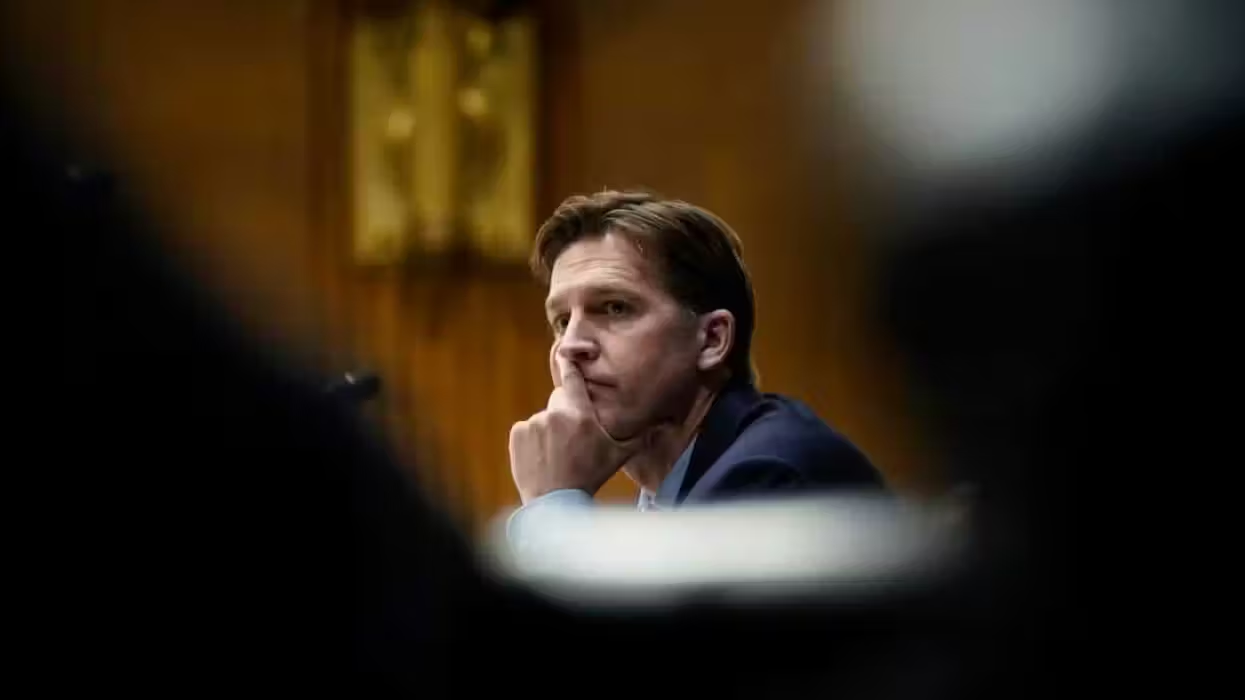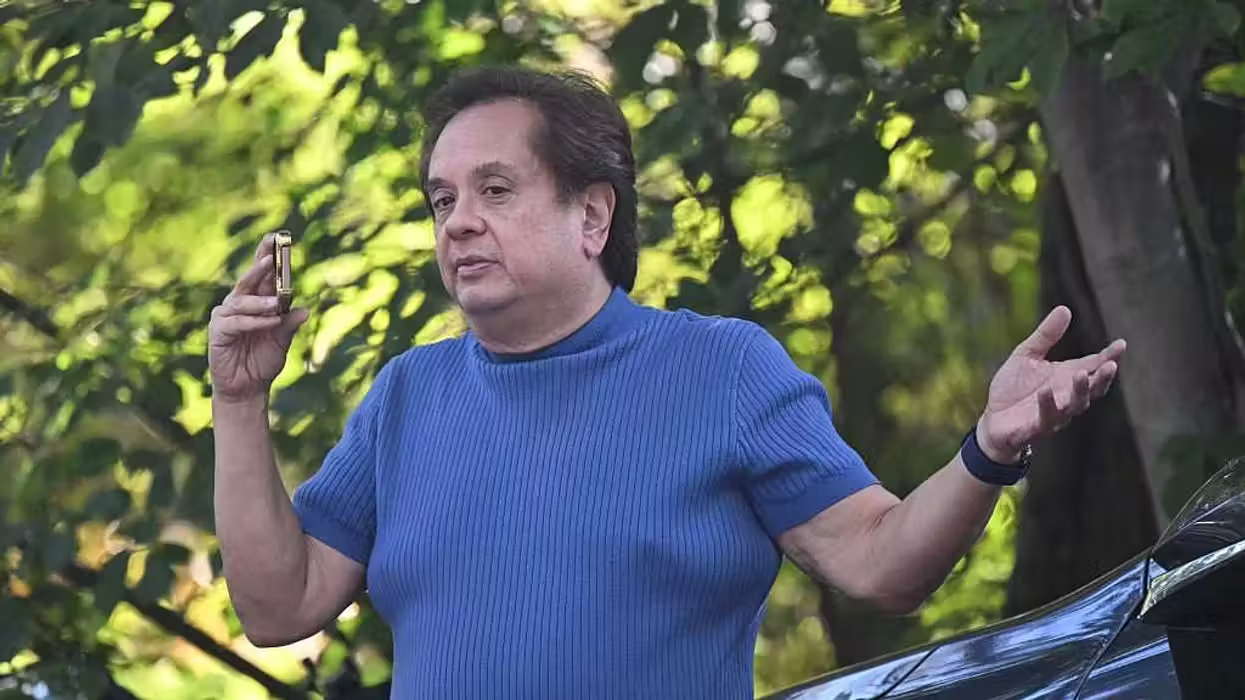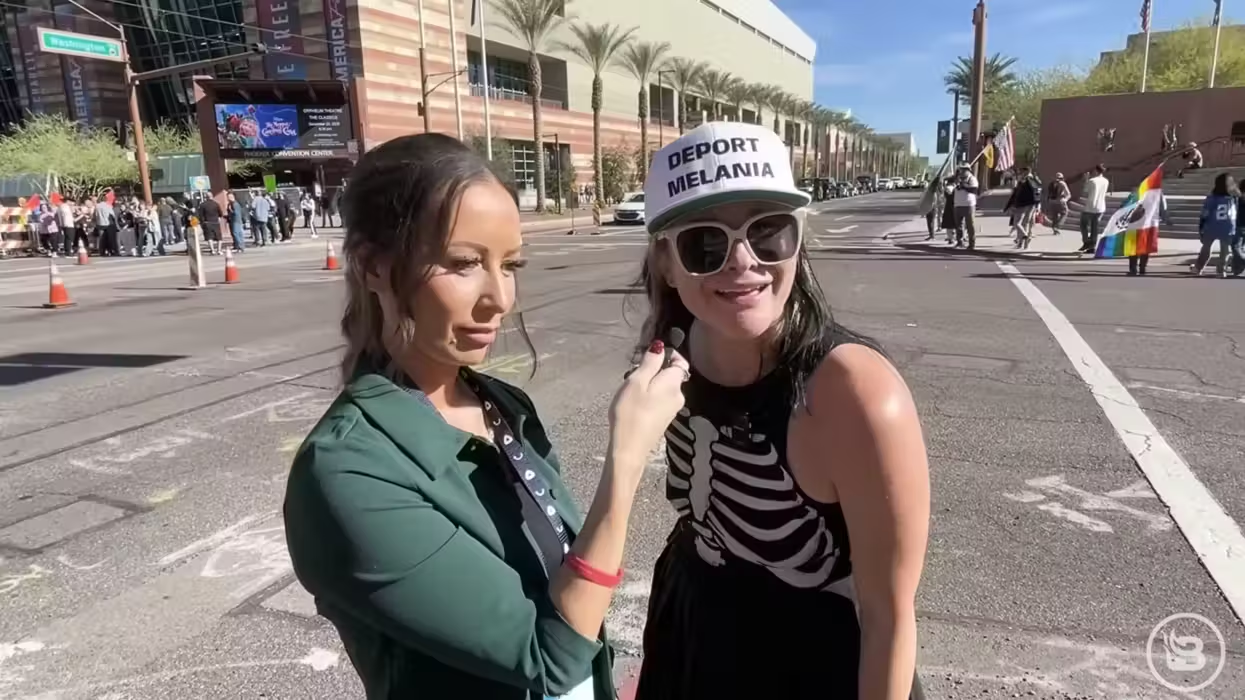
© 2025 Blaze Media LLC. All rights reserved.
An interview with Ben Shapiro on his criminal case against the Obama administration: 'The People vs. Barack Obama
June 13, 2014
Shapiro talks with TheBlaze Books about the lawless Obama administration, Benghazi, the IRS, blanket amnesty and much more.

Conservative commentator Ben Shapiro, author most recently of books including "Bullies" and "Primetime Propaganda" has a new book out this week titled "The People Vs. Barack Obama: The Criminal Case Against the Obama Administration."
In the book, Shapiro makes the case that the Obama administration has effectively acted as a criminal cabal, necessitating criminal prosecution by individual Americans in lieu of impeachment.
We spoke with the combative author yesterday to discuss the prospect of criminal prosecution against the president, the IRS scandal including its personal impact on Shapiro, President Obama's illegal arming of terrorists, the prospect of the president granting in effect mass amnesty to illegal immigrants and much more.
Below is our interview, conducted via phone, and edited for clarity and links.
Why should Blaze readers pick up this book?
Shapiro: Because this is a book that not only details all of the problems and scandals inside the Obama administration, but makes the charge that these are criminal problems, not merely political ones, and explains how we can remedy these issues without resorting to impeachment which is an insufficient remedy.
To that end, you are likely familiar with Andy McCarthy’s new book, in which he makes the case for impeachment. One question related to that is, why criminal prosecution over the impeachment route?
 Prosecutor Andrew McCarthy appears on The Glenn Beck Program June 12 to discuss how and why President Obama could be impeached. (Image Source: TheBlaze TV)
Prosecutor Andrew McCarthy appears on The Glenn Beck Program June 12 to discuss how and why President Obama could be impeached. (Image Source: TheBlaze TV)
Shapiro: Two points: First is, it’s important to start seeing the Obama administration as a criminal enterprise. It’s really the only way to understand what it is that they’re doing. What impeachment says this is a political problem. This is not a political problem, this is a criminal problem. And detailing it in those terms, in terms of what laws have been broken, is important to understanding exactly who these folks are, and what they’re doing, and exploiting their power. That’s number one. Number two: even Andy makes the case for impeachment but then he doesn’t actually call for impeachment. In the book he says, "Sure we should go ahead and, you know, theoretically the president is guilty of all these crimes and he should be impeached, but then he doesn’t say, "Well, okay so let’s go ahead with impeachment," because everybody understands, including Andy, that impeachment comes with certain political costs that people are simply not willing to undertake. Impeachment is "pie in the sky."
[sharequote align="center"]Impeachment is "pie in the sky."[/sharequote]
In the entire history of the United States we’ve impeached a grand total of 19 people in the House, and we've convicted a grand total of eight people in the Senate. And the country has been around for nearly 240 years. You’re talking approximately basically one actual impeachment every thirty years. And this particular solution is supposed to remedy all of the problems with the Obama administration? And even if you were to impeach President Obama, how does that change the honeycombed criminality of the entire administration? Joe Biden takes over and it’s the exact same thing. The whole point here is to change the system of government under which we live. It’s not enough to simply impeach individual officers, it’s not simply enough to impeach one person every thirty years. This requires a broad change in how we view government, and how we treat government when it acts criminally because if the only solution is impeachment, they’re going to get away with an awful lot of criminal activity.
How practically would this work? Typically, I would assume that American citizens wouldn’t have standing to bring a case against the president. Lay out the mechanics for us.
 Attorney General Eric holder speaks to reporters following a meeting on Capitol Hill in Washington, Tuesday, June 19, 2012. Holder was held in contempt by Congress for not releasing Justice Department documents regarding Operation Fast and Furious. Under Ben Shapiro's theory, the family of Brian Terry, the U.S. border agent killed with a gun that was part of the operation, could file suit against the Obama administration. (Image Source: AP Photo/Susan Walsh)
Attorney General Eric holder speaks to reporters following a meeting on Capitol Hill in Washington, Tuesday, June 19, 2012. Holder was held in contempt by Congress for not releasing Justice Department documents regarding Operation Fast and Furious. Under Ben Shapiro's theory, the family of Brian Terry, the U.S. border agent killed with a gun that was part of the operation, could file suit against the Obama administration. (Image Source: AP Photo/Susan Walsh)
Shapiro: Well actually under RICO [Racketeer Influenced and Corrupt Organizations Act] standing is significantly less of a problem. So you just have to find somebody who is damaged by the criminal conspiracy. So for example, let’s take a couple very practical examples. Can the family of Brian Terry sue the Obama administration for Brian Terry’s death in Fast and Furious? Right now, the answer is basically no, because suing the executive branch is considered unpalatable, and under RICO law it’s questionable as to how high up the chain you can sue. What I propose is changing the RICO law so that you could sue the President of the United States, the Attorney General of the United States and you wouldn’t have to have direct – what RICO requires is criminal enterprise – meaning everybody has to have the same goal, and everybody has to have participated in the creation of this enterprise towards that goal. That’s a very different standard from, "There has to be a direct piece of paper from President Obama to Eric Holder, and one from Eric Holder to the folks pushing Fast and Furious saying, "You will smuggle these weapons across the border in violation of American law."
So RICO is significantly broader. It was designed to go after the Mafia, specifically in cases where the Mafia did have plausible deniability. So in that case, clearly Brian Terry’s family has standing, they would be able to sue in what I propose in a RICO case against the Obama administration, and they would be able to win damages against individual officers of the United States.
Same thing would happen with regard to the four folks who died in Benghazi. Their families could sue the Obama administration for negligent homicide for example if RICO was broadened to include negligent homicide which it should be…or violations of the Arms Export Control Act, which is what I have suggested also happened in Benghazi.
The finding of standing is actually not that difficult in most scandals because most scandals actually damage somebody. So my friend Jeremy Boreing from Friends of Abe should be able to sue the Obama administration under RICO for violations of IRS law. That’s what I’m proposing.
And so in terms of amending RICO, is that something you could simply pass through Congress?
[sharequote align="center"]If there’s one thing the Democrats love more than anything it’s trial lawyers[/sharequote]
Shapiro: Yes. That’s a basic paragraph that you have to add to RICO that would broaden the scope of charges under which RICO could be charged, and that would add the ability to sue the executive branch and individual officers within it. Right now actually some of this is a gray area in law, because some executive branch officials can be sued, other executive branch officials can’t be sued – no one’s really taken the time to figure it out. But it should explicitly be changed in law so that you can sue these folks.
And you could actually come up with a semi-bipartisan consensus on this for a couple of reasons. The first is, there are a lot of folks who I’m sure wanted to sue the Bush administration, and number two, the truth is that if there’s one thing the Democrats love more than anything it’s trial lawyers. They’re pretty litigious folks, so getting folks to sign off on new legislation that would allow for more heavy spending trials is usually not something difficult to pass in a Democrat controlled legislature.
Now moving to some of the substance of the book, of the counts you lay out, what do you find most damning? Is there one particular example that kind of blows the other examples out of the water in terms of building a criminal case?
[instory-book ISBN="9781476765136"]
Shapiro: The most obvious criminal case in terms of a RICO violation would probably be the IRS scandal. I mean the IRS scandal – it’s so obvious what happened there where President Obama went out and he did exactly what a Mafia boss would do. He went out and said, "Oh, wouldn’t it be great if somebody knocked over this bank?" And then one of his low level guys goes and knocks over a bank…I mean shocker. President Obama repeatedly kept saying over and over that Tea Party groups were the death of the American political system, that the exploitation of 501(c)(4) status had destroyed the American political system, and that we had to take action against these groups. And then a bunch of his friends in the Senate sent letters to the IRS saying "It’d be great if you’d take an extra look at these Tea Party groups." The IRS begins coordinating with the FBI on all of these groups, and suddenly low-level staffers have gotten it in their heads that it would be a wonderful thing to start checking out 501(c)(4) groups. So is all of this a giant coincidence, or is it more of a criminal enterprise?
[sharequote align="center"]What RICO does is basically establish that there’s a criminal enterprise with a common goal[/sharequote]
That’s a textbook example of where RICO would work beautifully, because what RICO does is basically establish that there’s a criminal enterprise with a common goal, and they take overt action toward that common goal, which is exactly what happened here. So that’s probably the best case that would be easiest to prosecute if you actually had a DOJ that wanted to, against the Obama administration. But I mean the book is replete with examples of Obama administration criminality.
Another obvious one: President Obama smuggling arms into Libya and Syria. This is in direct violation of the Arms Export Control Act. You don’t get to smuggle arms to terrorist groups in violation of law without notifying Congress. And the president basically admitted guilt on that. In September 2013, after he smuggled a bunch of American weapons through American sources in Qatar and in Libya to Syria, in September 2013 he waives the applicable provisions of the Arms Export control act. Now the President of the United States could have done that a long time ago. He could have just said, "Look, I’m putting arms in there, and I’m waiving provisions of the Arms Export Control Act." The president has the power to do that under the Act. He didn’t bother to do that because he didn’t want anybody to know he was doing it. In fact, the administration repeatedly denied, or they were at the least very unclear about whether we were in effect smuggling weaponry into Syria, or smuggling weaponry into Libya. And so that’s another case where the president obviously violated the law.
Jumping back to the IRS example, one thing I noticed in the book was your own personal experience dealing with the IRS in terms of creating a group. Speak a little bit to that.
 Former Internal Revenue Service (IRS) official Lois Lerner speaks on Capitol Hill in Washington, Wednesday, March 5, 2014, during the House Oversight and Government Reform Committee hearing on the the agency's targeting of tea party groups, where she invoked her constitutional right not to incriminate herself. (Image Source: AP Photo/Lauren Victoria)
Former Internal Revenue Service (IRS) official Lois Lerner speaks on Capitol Hill in Washington, Wednesday, March 5, 2014, during the House Oversight and Government Reform Committee hearing on the the agency's targeting of tea party groups, where she invoked her constitutional right not to incriminate herself. (Image Source: AP Photo/Lauren Victoria)
Shapiro: I was trying to create a 501(c)(3) group that was called "One Light," and it was designed to sponsor young Jewish students who couldn’t afford it to visit Israel. And there are plenty of groups that are like this that have 501(c)(3) status, and we were absolutely stonewalled by the IRS. In fact Lois Lerner was one of the people who stonewalled us. We were stonewalled by low-level agents of the IRS who said [paraphrasing], "We have to give extra scrutiny to this because we don’t understand what flying students to Israel has to do with a religious organization." "Well, excuse me, it’s Jewish students…to Israel – what’s the problem here?" They stonewalled it for about a year, and then they started kicking back on us, and they wanted more and more documentation. They wanted to know who the donors were, etc. And finally we just – as I’m sure many people did -- dumped it. We threw the application because we didn’t feel like being audited that day.
One of the recurring themes in the book is the fact that despite what the president and others says is that heads never roll in any of the scandals you reference in the book. How much of that do you attribute that to the media versus actual GOP complicity in some ways, in terms of Congress not doing its job in terms of oversight and its other powers?
Shapiro: I think that, a lot of it has to do with…I don’t know what Congress can do. They’ve had investigations, and unless they’re willing to start impeaching folks, what exactly can they do? The DOJ is charged with criminal activity. Eric Holder is the lead criminal in the Obama administration. He is the Praetorian Guard. He’s the guy standing at the door and allowing all this criminality to take place. So, it’s no surprise that nothing is getting done, because the fox is in charge of the henhouse. He’s never going to prosecute anybody inside the Obama administration which is why I think so many people are frustrated. I mean Congress has held the Attorney General of the United States in contempt, and he doesn’t give a damn. So exactly what are we supposed to do at this point?
[sharequote align="center"]Eric Holder is the lead criminal in the Obama administration[/sharequote]
I think that – is there some gutlessness in Congress? Sure. There always is a certain amount of gutlessness in Congress which is why – there actually used to be more remedies for stuff like this. Under the Independent Special Counsels Act, we used to be able to appoint somebody like Ken Starr who had the ability to prosecute based on his special investigation. That expired in 1999 after the impeachment hearings against Clinton, and Congress pretty promptly said we’re not going to renew that. So there are no special prosecutors anymore. So basically there’s no one policing. There’s no one with the capacity to police.
So the question becomes, if Congress isn’t gonna do it, and if the executive is not gonna police itself which clearly it’s not going to, then why not take advantage of the fact that Americans are the most litigious group of people on the planet? We’ll sue anybody for anything at anytime, so why not take advantage of that and throw a wrench into the workings of an executive branch that is bent on consolidation of power?
Now let’s say that in 2014 you have a huge GOP landslide, garnering a majority in the Senate, and they are able to amend the law such that you can pursue these types of charges via RICO. What’s to say that the president wouldn’t just delay whatever was being thrown at him in courts, and run out the clock?
 President Barack Obama answers questions on violence in Iraq during his meeting with Australian Prime Minister Tony Abbott, Thursday, June 12, 2014, in the Oval Office of the White House in Washington. (Image Source: AP Photo/Pablo Martinez Monsivais)
President Barack Obama answers questions on violence in Iraq during his meeting with Australian Prime Minister Tony Abbott, Thursday, June 12, 2014, in the Oval Office of the White House in Washington. (Image Source: AP Photo/Pablo Martinez Monsivais)
Shapiro: Well they can try to run out the clock. And presumably you would have injunctive orders filed and you would have the courts trying to force action, and then you would have what really does turn into a Constitutional crisis, which I think is necessary. We need it. It’s about time. I think that what’s so funny is that every time the legislature runs up against the executive branch, we keep hearing from folks, "Well it’s a Constitutional crisis." "No. That’s how the Constitution works, that’s how it was designed to work, with gridlock and the branches bashing the crap out of each other."
Let's put it this way: the only effective mechanism thus far for getting the Obama administration to be in the least transparent has actually been the judicial branch. It’s been folks over at places like Judicial Watch, suing under FOIA [The Freedom of Information Act] to get documents. That’s the only reason we know about half the stuff that’s going on. So if we’re going to look to government itself as the solution which –if we have to look outside government, we’re all in serious trouble…because then we’re talking about something completely different. But if we’re gonna look inside government for a solution, then we’re certainly not gonna find it in the executive branch, we’re certainly not gonna find it in the legislative branch, the only remaining branch is the judiciary.
Given the news in the last couple of weeks on immigration, where would criminal action fall in your book, and how would that chapter read?
 Children hold up anti-deportation signs at a rally sponsored by local immigrant rights organizations, Wednesday, April 30, 2014, in Homestead, Fla. The event was part of a national campaign led by the National Alliance of Latin American and Caribbean Communities (NALACC) which urges President Obama to provide immediate relief from deportation to undocumented immigrants. (Image Source: AP Photo)
Children hold up anti-deportation signs at a rally sponsored by local immigrant rights organizations, Wednesday, April 30, 2014, in Homestead, Fla. The event was part of a national campaign led by the National Alliance of Latin American and Caribbean Communities (NALACC) which urges President Obama to provide immediate relief from deportation to undocumented immigrants. (Image Source: AP Photo)
Shapiro: Well I actually do talk a bit about immigration in the book – I talk about obstruction of justice because what President Obama has done with the DREAMERs is obstruction of justice. That is not…he claims that it falls under "prosecutorial discretion." It absolutely does not. It falls directly under obstruction of justice…I mean this is an administration that obstructed the state of Arizona from enforcing federal law, and then obstructed itself from enforcing federal law. So President Obama and what he’s doing with immigration right now is absolute obstruction of justice. And if it were happening in the private sector – if there was someone who was smuggling immigrants across the border, they would immediately be sent to prison. I mean this would be: do not pass go, do not collect $200. This is obvious stuff, but nonetheless…nothing in the Constitution gives President Obama the authority to allow selective prosecution for different types of illegal immigrants. There’s nothing there that gives him that power. There’s no other way to see this other than obstruction of justice.
[sharequote align="center"]Obama on the immigration issue has the country a little bit by the shorts[/sharequote]
Now, there is a big problem here, and this is where impeachment really does come in, and would be the only remedy. Impeachment really would come in if President Obama does what I think he’s going to do, which is, let’s say that he does a "Jimmy Carter blanket amnesty" of everybody. Not even he waives prosecution, let’s say it’s just blanket amnesty…he does what Carter did for draft dodgers…then you’ve got a serious Constitutional crisis on your hands, because that really does not count as a high crime or misdemeanor under the Constitution. It’s actually an exercise of authority granted the president under the Constitution, but it’s so wildly beyond what the Founders even thought possible from the president, that you’d probably have impeachment hearings, and then you really would have a political crisis because here’s the problem: impeachment doesn’t really solve that problem. Because how do you undo that order? How do you get rid of it? Presumably you could have an act of Congress. Can an act of Congress override the amnesty, or is that now an ex post facto law? So Obama on the immigration issue has the country a little bit by the shorts.
Have you spoken with any folks inside or outside of Congress about drafting language and putting some teeth behind what you propose?
Shapiro: Yea, I’ve been reaching out to folks this week since the book came out. And I’m looking forward to having some discussions with some relatively high-level members of Congress about it. But it’s a serious change. I mean what we’re talking about is basically hamstringing – it’s cutting the Achilles heel of the executive branch. And so there’s a lot of hesitation and there’s a lot of trepidation, but there always is going to be from a legislative branch that prefers to delegate its powers to the executive branch to avoid accountability. This is the dirty little secret of American government. The legislature doesn’t police the executive because the more power the executive has, the less the legislature is held accountable.
[sharequote align="center"]Let the American people be the protectors of their own liberty[/sharequote]
So what I’m trying to do and the reason I’m talking about delegating to the American people is to take it out of the hands of the legislature as well. Take it directly back to the American people, let the American people be the protectors of their own liberty. And by the way, you’ve seen some of this happen already: Larry Klayman’s lawsuit, which was at least partially successful, with regard to the Obama administration’s violations of the Fourth Amendment under the Edward Snowden information. So private lawsuits actually have been used under some of these circumstances. What I’m arguing is for the broader application of exactly that.
_
Follow Ben Weingarten (@bhweingarten) and TheBlazeBooks on Twitter and Facebook.
Want to leave a tip?
We answer to you. Help keep our content free of advertisers and big tech censorship by leaving a tip today.
Want to join the conversation?
Already a subscriber?
Ben Weingarten is a writer, commentator, and editor at large at RealClearInvestigations. He is a senior contributor at the Federalist and writes columns for Newsweek and the Epoch Times.
Ben Weingarten
Ben Weingarten is a writer, commentator, and editor at large at RealClearInvestigations. He is a senior contributor at the Federalist and writes columns for Newsweek and the Epoch Times.
more stories
Sign up for the Blaze newsletter
By signing up, you agree to our Privacy Policy and Terms of Use, and agree to receive content that may sometimes include advertisements. You may opt out at any time.
Related Content
© 2025 Blaze Media LLC. All rights reserved.
Get the stories that matter most delivered directly to your inbox.
By signing up, you agree to our Privacy Policy and Terms of Use, and agree to receive content that may sometimes include advertisements. You may opt out at any time.






